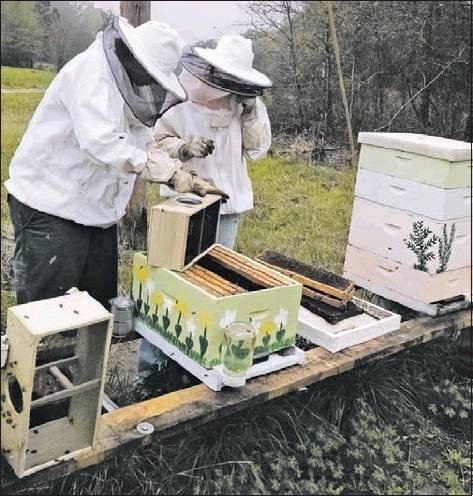What stings like fire but makes sweet honey?
I have a love-hate relationship with bees.
I was quite traumatized as a child. A confused bee, trapped in my long hair, angrily stung me.
I grew up around beehives and loved to watch my …
This item is available in full to subscribers.
Subscribe to continue reading. Already a subscriber? Sign in
Get 50% of all subscriptions for a limited time. Subscribe today.
Please log in to continueNeed an account?
|
What stings like fire but makes sweet honey?
I have a love-hate relationship with bees.
I was quite traumatized as a child. A confused bee, trapped in my long hair, angrily stung me.
I grew up around beehives and loved to watch my grandparents’ honey extractor “sling” honey into the collector jar.
I also scarfed down all the sweet honeycomb they would let me chew.
Dad and Granddad looked quite funny in their beekeeping garb. I thought they looked like astronauts.
A long history
Paintings of beehives date back to 15,000 BC.
Chucks of amber have preserved prehistoric bees, and the hard-working buzzing insects have been found in fossil records.
Ancient paintings, dating back 8,000 years in Spain, show humans getting honey from a beehive in rocks.
Illustrations in ancient Egypt show the use of hives.
Hittite writings referencing bees were found in Anatolia, Turkey dating back to 1,500 BC.
Europe had a tradition of the “telling of the bees” which said the bees had to be told of deaths, marriages and other important events in the beekeeper’s life.
If the bees were not told, they would leave, stop honey production or die. This led to some strange traditions.
In Scotland, beehives were invited to weddings, and a slice of cake was left for them to enjoy. If the beekeeper died, it was said that bees grieved, and one had to break the news to them gently.
Hives were even rotated to face the funeral procession and draped with a mourning cloth.
A German tradition was that the wife must say “little bee, our lord is dead; leave me not in my distress.”
Honey harvesting
Bees and humans have a long and tumultuous relationship.
We plant flowers to give them pollen, which makes the bees smile, and then we take their honey.
In the fall, the phrase I heard was “it is time to rob the bees.” This phrase accurately describes honey harvesting from the bee’s viewpoint. Bees store up honey to survive the winter.
According to bee-america.com, some ancient cultures saw honey hunting a competitive sport, which required specialized skills, and perhaps a high pain tolerance to bee stings.
Bee hunters would start in the spring to watch where the bees “bee-lined” after gathering pollen. They marked the location of the hive for the fall honey-harvesting event.
When it was time to gather the sweet honey, they took crocks, jars, and iron kettles filled with coals to the hive. The hot coals created a thick smoke to keep the bees calm while they stole the honey. Those working closest to the hive would come away with the stinging war wounds of angry bees trying to defend the hive.
These early honey-hunting expeditions were rewarded with a bountiful sweet harvest but destroyed the hive, and all the bees died.
In time, beekeepers learned to take the honey and leave some for the bees. The bees seemed happy with this arrangement.
Man began to keep bees in bee skeps – coiled straw hives and dried mud cylinders.
In 1851, Rev. Lorenzo Langstroth invented the sliding frames for bee boxes. According to a fascinating online document, beehives were included in wills, given as offerings to the church, and honey and beeswax were used as rent payments and tithes.
Beekeeping has not changed much, but the equipment has been upgraded. Moses Quinby invented the bee smoker in 1873, and Thomas Wildman developed a better “bee box” to hold the sliding frames.
As for me, I use honey in my hot tea and plant bee-friendly flowers.
I’ll stay away from honey harvesting and give all beekeepers a big thank you!
Other items that may interest you







Comments
No comments on this item Please log in to comment by clicking here